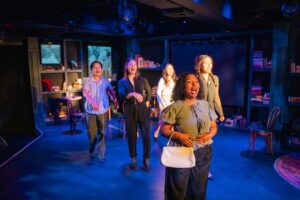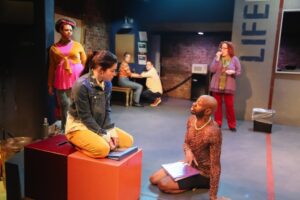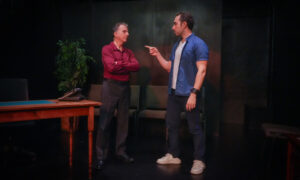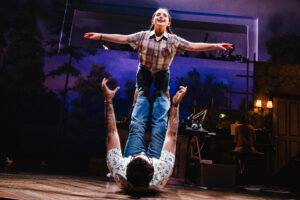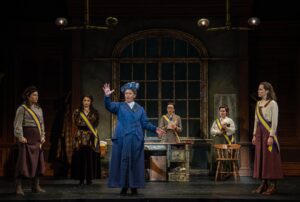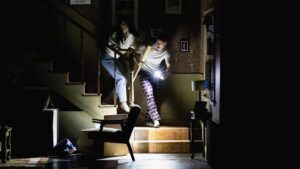After the strong background provided, in profusion, in Part One, the second full evening consists of two plays within the play. In continuing “meta” style, the actors playing the students present the results of their research. This time, the narratives are more coherent, if not exactly pleasant, as we watch the Bauhaus struggle to survive, first in Dessau, and then in the “belly of the beast,” Berlin, before the Nazis, who have gained enough power in 1933 to shut the school down altogether.
Audiences are greeted by “Brec” (Chloe Madriaga), who passes out the “program” the students have devised for each section. We learn that, when the school moved to Dessau, the school adopted the idea of “gesamkunstwerk,” which means “total work of art,” a concept espoused by Wagner as he wrote his musical and performative masterpieces. To accomplish this, “The Bauhaus Idea” became the catch-all phrase. Oscar Schlemmer, (played by John C. Sweet as “Kai”) the Bauhaus master and the choreographer for the school, devised the Triadic Ballet, a distinctive dance style, shown off by the students during the presentation.
As the school experimented with art as mass production, such practical applications as the “Barcelona Chair,” and other innovations came rolling out. But along with the expansion of the Bauhaus way, chilling effects within and without began to pull against the fabric of the school.
Central to many of the polemics became the so-called ethnic question: those with Jewish backgrounds began to feel the pressure, and some, such as Arnold Shoenberg, were able to escape to Los Angeles in time to be commemorated by Shoenberg Hall at UCLA.
Again, playing a profusion of parts, our meta students weave in and out of their own presentation, at one moment playing their fictional selves, and at others, donning the trappings of the characters they represent.
BERLIN: As pressures mounted on the school, the ill-fate decision to move to Berlin comprises the second playlet that they have devised. There, armed with the decree that “Art should serve the state,” Bauhaus became increasingly polarized between Nazi slogans and the demands of the “Bauhaus way.” For instance, Gunta Stosl, played by Brec (again Chloe Madriaga) is thrown into a quandary by her marriage to a Jewish Palestinian named Arieh Sharon, and must depart the school in order to protect him. In the final moments, Schlemmer’s “The Bauhaus Staircase,” becomes the metaphor for the school’s departure.
While this impressive two-part theatre piece is important in itself, the fact that it mirrors what might become a possibility for us here in the “land of the free” comprises a chilling warning for us all. Kudos for Tom Jacobson’s research and creativity and to the young cast of its versatility.
Parts One and Two of the Bauhaus Project continue at the Atwater Village Theatre, 3269 Casitas Ave., Los Angeles CA 90039 on select days and times through August 25th. Tickets for one performance are $35; while the two-part production runs at a discounted rate of $50. For reservations & more information, call (323) 882-6912 or online at www.openfist.org.


